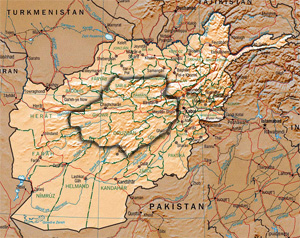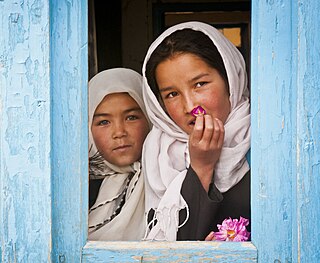
The Hazaras are an ethnic group and a principal component of the population of Afghanistan, native to, and primarily residing in, the Hazaristan region in central Afghanistan and the northern regions of the Baluchistan province in Pakistan. They are one of the largest ethnic groups in Afghanistan, and a significant minority group in Pakistan, mostly in Quetta, as well as in Iran. They speak the Dari and Hazaragi dialects of Persian. Dari is one of the two official languages in Afghanistan.
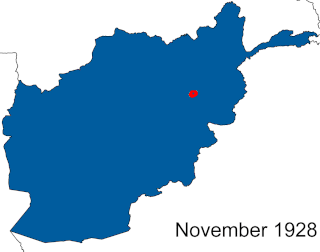
The Afghan Civil War was fought from 14 November 1928 to 13 October 1929. Rebelling, and subsequently governing Saqqawist (Saqāwīhā) forces under Habibullāh Kalakāni fought against various opposing tribes and rival monarchs in the Kingdom of Afghanistan, among whom Mohammed Nādir Khān eventually achieved a preponderant role. Despite early successes, such as the capture of Kabul and defeat of Amanullah Khan on 17 January 1929 or the capture of Kandahar on 3 June, the Saqqawists were eventually deposed by anti-Saqqawist forces led by Nadir on 13 October 1929, leading to Nadir's ascension as King of Afghanistan, who ruled until his assassination on 3 November 1933.
Malistan or Malestan, is a district in Ghazni province, Afghanistan. Its population, which is 100% Hazara, was estimated at 350,000 in 2009. The district capital is Mir Adina.
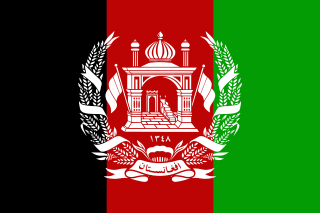
The Kingdom of Afghanistan was a constitutional monarchy in Central Asia established in 1926 as a successor state to the Emirate of Afghanistan. It was proclaimed by its first king, Amanullah Khan, seven years after he acceded to the throne. The monarchy ended in the 1973 Afghan coup d'état.
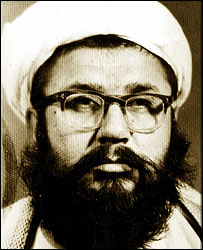
Sayed Isma'el Balkhi was one of the most prominent Hazara reformist leaders in 20th-century Afghanistan. An innovative poet and well-known mystic, charismatic political leader and untiring reformist; Balkhi is undoubtedly the figurehead of modern Hazara history.
The Sheikh Ali are a major tribe of Hazaras. Inhabiting in Afghanistan generally in Parwan, Kunduz, Baghlan, and Bamyan provinces and in other parts of the country.

The Hazaras have long been the subjects of persecution in Afghanistan. The Hazaras are mostly from Afghanistan, primarily from the central regions of Afghanistan, known as Hazarajat. Significant communities of Hazara people also live in Quetta, Pakistan, and in Mashad, Iran, as part of the Hazara and Afghan diasporas.

The Hazara people are an ethnic group who are mostly from Afghanistan, primarily from the central regions of Afghanistan, known as Hazarajat, they established a large diaspora that consists of many communities in different countries around the world as part of the later Afghan diaspora. There are currently a million Hazara who live in the Balochistan province of Pakistan mostly in Quetta, many of whom have been settled in the country for generations and are now Pakistani citizens. A similarly large Hazara community is also present in Mashhad, Iran, as part of the Hazara and Afghan diaspora.
Hazara cuisine or Hazaragi cuisine refers to the food and cuisine of the Hazara people in Afghanistan and western Pakistan. The food of the Hazara people is strongly influenced by Central Asian, South Asian cuisines and shares similarities with neighboring regional cuisines in Afghanistan and Central Asia. However, there are certain dishes, culinary methods and styles of cooking that are unique to the Hazara people.
Hazara culture refers to the culture and tradition of the Hazara people, who live primarily in the Hazarajat region of central Afghanistan, the Balochistan province of Pakistan, and elsewhere around the world where the Hazara diaspora is settled as part of the wider Afghan diaspora.

Slavery in Afghanistan was present in the post-Classical history of Afghanistan, continued during the Middle Ages, and persisted into the 1920s.
Starting in the 1880s, various Pashtun-dominated governments of Afghanistan have pursued policies, called Pashtunization, aimed towards settling more ethnic Pashtuns in the northern region of Afghanistan.

The 1888–1893 Hazara uprisings or massacre and displacement of Hazaras occurred in the aftermath of the Second Anglo-Afghan War when the Afghan Emirate signed the Treaty of Gandamak. Afghan Amir Abdur Rahman Khan set out to bring the Turkistan, Hazaristan, and Kafiristan regions under his control. He launched several campaigns in the Hazarajat due to resistance to oppression from the Hazaras, culminating in the Battle of Uruzgan and he conducted a widespread campaign against its population.

Hazara Australians or Australian Hazaras are Australians who have Hazara ancestry. The Hazaras are an ethnic group native to, and primarily residing in, the mountainous region of Hazarajat in central Afghanistan. Many Hazara Australians have also migrated from Pakistan. The Hazara Council of Australia is an organization formed by the Hazara community of Australia. Hazaras constitute one of the largest ethnic groups of asylum seekers in Australia
The Chindawol uprising was an insurrection that took place on June 23, 1979 in the Chindawol district in the old city of Kabul, Afghanistan. The rebellion was caused by the arrests of scholars and influential fighters of the city's Shia communities by the ruling Khalq-PDPA government. Chindawol was predominantly populated by these communities. The protests started when residents attacked and held a police station that day, marching on the streets and on Joda-i Maiwand whilst shouting religious and anti-government slogans. Several thousands took part. The government brutally cracked down on them in a four-hour battle and around 10,000 Hazaras were arrested and executed.
The 1945 Hazara Rebellion was a rebellion by the Hazaras in the Kingdom of Afghanistan which occurred in 1945 and 1946. Its causes laid in the introduction of a new tax imposed only on the Hazaras. It began in November 1945, when Hazara Rebels under Ibrahim Khan, also known as "Bačča-Gāw-sawār" revolted against the local administration of Shahristan. After a siege lasting for about a week, the district, as well as arms and ammunition, fell into the hands of the rebels.
The Enlightenment Movement or Junbesh-e Roshnayi is a grassroots civil disobedience movement of Hazaras created in 2016 in Afghanistan in response to the Afghan government's change in routing plans for proposed international electricity networking, which was perceived as continuing historical anti-Hazara discrimination. The group organised major protests in Afghanistan and internationally during 2016 and 2017, protesting against discrimination. The group's youthful leadership challenged traditional Hazara leaders for representativity of the community.

Muhammad Yusuf Khan Hazara known as Sulat al-Sultanah Hazara ; was a politician and the first Sunni and Hazara representative member in the Iran parliament for National Consultative Assembly and he is the only sunni Iranian who has represented Mashhad in the history of Iran's legislatures.


